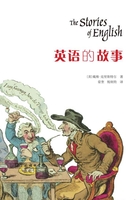
插叙5 两部《彼得伯勒编年史》
《盎格鲁-撒克逊编年史》并没在1066年戛然而止:在一份手稿中,我们发现,其记载一直延续到诺曼人征服后的近一个世纪。这就是《彼得伯勒编年史》,其名称源于最初的抄写地点,即位于剑桥郡的彼得伯勒本笃会修道院,目的可能是替代五年前的另一手稿本,那个本子在五年前的一场大火中毁于一旦。11现存本的起抄时间是1121年,材料也更新到那一年,后来有不少抄写员在续抄,并一直坚持到1131年为止。接下来的23年间,没有新的内容加入,而这段时间恰好与斯蒂芬国王的统治大致重叠,那是一个无政府主义的混乱时代,想必没有机会去反思与记录历史。但在1154年斯蒂芬死后,该编年史立刻又有了更新,也是起于当年的——可能是某位续写者的个人努力之作——而且增加了6份年鉴,都记载有那个时期的一些重要事件,其中之一(1137年的年鉴)就是那段对每个人都产生了深刻影响的苦难经历的著名描述。12
那段23年的空缺,对后来的英语史学家而言,具有极为重要的语言学意义。《彼得伯勒编年史》的条目中,截至1131年的部分都用古英语写成,属标准的西撒克逊文学语言(第54页);而其后的条目则非常不同,拼写、语法、词汇等都不得不让人将其看作中古英语的早期形式。该编年史并非中古英语的最早例子,享有这一美誉的或许应该是《肯特布道文集》(第107页);但它却是已知的最早使用中东部方言写成的文本,而标准现代英语正是由此发展而来的(第243页)。此外,《彼得伯勒编年史》的最终延续,之所以令人特别感兴趣,还因为其风格与晚期的西撒克逊语非常类似,这一点,只要直接比较就可得知,而晚期西撒克逊语的比较样本仅比它早25年。古英语到中古英语的过渡,表现得如此明显,这是绝无仅有的。
下面两段摘录可以说明这一过渡。它们在有些方面极为相似,而在别的方面则又完全不同。第一个摘录是1123年条目的开头,第二个是1137年(但写于1154年)条目的开篇。首先,在这个古英语的晚期,我们已经可以看到,与早期用法的诸多不同(如cyning成了king),但很多重要特征却依然存在,比如On þyssum geare和 to þam kying中的与格形式、古英语的定冠词se,he(hine)的宾格形式、主谓语的词序颠倒(第101页),以及古英语的一些惯用语如on an half him等。
On þyssum geare wæs king Henri on Cristes tyde at Dunestaple,
In this year was king henry at Christmas time at Dunstable,
这一年,国王亨利于圣诞期间住顿斯坦不利
7 þær comen þes eorles sandermen of Angeow to him.
And there came of the earl messenger of Anjou to him.
[=there came to him messenger of the Count of Anjou]
那时来了个安茹公爵的信使拜见于他
7 þeonem he ferde to Wudestoke, 7 his biscopes 7 his hird eal mid him.
And from there he traveled to Woodstock, and his bishops and his retinue all with him.
于是他旅行去了伍德斯托克,主教扈从与她随行。
Þa tidde hit on an wodnesdei, þet wæs on iiii Idus Iannuareii,
Then happened it on a Wennesday, that was on fourth Ides of January,
[=the fourth day before the Ides of January, i.e., 10 January]
于是发生了这事,那是罗马历的一月第四日,
þet se king rad in his derfald; and se biscop Roger of Seresbury on an half him
that the king rode in his deer-park; and the bishop Roger of Salisbury on one side of him
国王正骑马在他的鹿苑;索尔兹伯里的罗杰主教在他的一侧
and se biscop Rotbert Bloet of Lincolne on oðer half him, 7 riden þær sprecende.
And the bishop Robert Loet of Lincoln on other side of him, and were riding there talking.
林肯的罗伯特·劳埃特主教在另一侧,他们一边骑马一边闲谈。
Þa aseh dune se biscop of Lincolne 7 seide to þam king, Laferd kying, ic swelte.
Then sank down the bishop of Lincoln and said to the king, Lord king, I perish.
突然林肯的主教跌下马来,向国王说道:国王我主,我要死了。
7 se king alihte dune of his hors 7 alehte hine betwux his earmes
And the king jumped down from his horse and lifted down him between his arms
于是国王纵身跳下骏马,把他扶躺在自己胸前
7 let hine beran ham to his inne, 7 wearð þa sone dead.
And had him carried home to his lodging, and became then straight away dead.
又让人送他回归家里休养,可他还是当即就去世了。
稍后的文本继续显示着古英语的某些特征(以词序为例,我们看到在þa之后出现了颠倒,在Henri King的名词之后出现了形容词),但也有许多不同之处:定冠词变成了þe(也拼作te和the),he的宾格成了him,而且在好几个地方,几乎也都再无注解的必要,因为词序都更加熟悉,句法也都更接近现代式样-如逮捕罗杰主教的那个片段所示。另外,把编年史作为整体加以考察,我们便会发现很多变化正在发生-词尾使用和词语顺序前后不一,相当怪异的表达也经常出现(如下面所注解的从句),给人的印象是:作者试图使用一套新的语言资源以创造一种恰当的风格。
Ðis gære for þe king Stephne ofer sæ to Normandi and ther wes underfangen
This year went the king Stephen over to Normandy and there was received
这一年,国王斯蒂芬远涉去到诺曼底,并在那儿接受款待
forþi ðat hi uuenden ðat he sculde ben alsuic alse the eom wes,
because they expected that he would be just such as the uncle was
因为他们期望他会向他的伯父一样
and forhe hadde get his tresor; ac he to-deld it and scattered sotlice.
and because he had still his treasure; but he squandered it and dissipated foolishly.
也因为他依然还有财宝;但他已将其挥霍殆尽,还愚蠢地闲游浪荡。
Micel hadde Henri king gadered gold and syluer, and na god ne dide me for his saule thar-of.
Much had Henry king amassed gold and sylver, but no good not did one for his soul with it.
亨利国王曾积累了大量金银,却没有做过一件善事以拯救他的灵魂。
[=but no good did it do him for the salvation of his soul]
Þa þe king Stephne to Englalande com, þa macod he his gadering æt Oxeneford,
When king Stephen to England came, then held he his council at Oxford,
斯蒂芬来到英格兰时,便把议会开在了牛津,
and þar he nam þe bicsop Roger of Sereberi, and Alexander biscop of Lincoln
and there he arrested the bishop Roger of Salisbury, and Alexander bishop of Lincoln
也是在那儿他逮捕了萨利斯伯里的罗杰主教,还有林肯的亚历山大主教
and te canceler Roger, hise neues, and dide ælle in prisum.
and the chancellor Roger, his nephews, and put all in prison.
以及大臣罗杰,他的几个侄子,并把他们全部投入监狱。
til hi iafen up here castle. Þa the suikes undergæton ðat he milde man was
until they gave up their castles. When the traitors perceived that he mild man was
直到他们放弃各自的城堡。当叛徒们感到他还是一个温和的人
and softe and god, and na iustice ne dide, þa diden hi alle wunder.
and easy-going and kindly, and no punishment not inflicted, then did they all atrocities.
既随和又善良,不会真有惩罚造成时,他们于是都振作起来。
Hi hadden him manred maked and athes suoren, ac hi nan treuthe ne heolden
They had him homage done and oaths sworn, but they no loyalty not kept.
他们向他致敬,许下种种诺言,但没有诚心不去遵守。
这两段摘录中,最显著的特征之一,恰是它们所不曾具有的东西:法语词汇。诺曼人在英格兰已有50多年-截至第二个摘录时期,则近100年-而在整部《彼得伯勒编年史》中,借自法语的新词却为数极少(30个左右)。第二段中的Castle无疑是个法语词,却是征服前的一个借词(第80页)。仅有的现代术语是canceler,tresor和iustise,除此而外,编年史的其他部分并无多少别的例子。在早期中古英语的其他文学文本中,正如我们将在第六章所看到的,法语词汇也同样有限。然而,不久之后,法语借词就将由涓涓细流变作滔滔洪水。
1 《春天已经来到》存于不列颠图书馆,MS Harley 978, f. 11b。《十一月三十天》见MS Harley 2341。关于综合性的中古英语抒情诗集,见Luria and Hoffman(1974)。
2 《肯特布道文集》现存伦敦不列颠图书馆,MS Cotton Vespasian D. xiv。《兰姆布道文集》现存伦敦兰姆宫,MS Lambeth 487。《三一文集》现存剑桥大学圣体学院,MS 335 B. 14.52。
3 男性代词的使用值得一提。绝大多数抄写员都应该是男性,但中世纪时也逐渐有女性受雇从事抄写工作的。偶尔我们会发现一些片段表明某个文本是女性所有的。12世纪晚期,一份用拉丁语写成、用于向圣母祈祷的布道文,就有这样一个注释:ego ancilla tua[我是您的仆人],其重要性在于,最后两个拉丁词的屈折变化形式都是阴性,而非阳性。此外,一份萨利斯伯里颂诗的抄本也是一样,其中的一个祈祷语,也有人将“你的家庭”由阳性形式的famulum tuum改成了阴性形式的famulam tuam。见Irvine(2000:53)。
4 见Swan(2000)。
5 分别见Lambeth 487和Royal 7 c. xii。例子见Swan(2000:72-75)。
6 该抄本见Lambeth 487。例子见Wilcox(2000:90,94)。
7 Irvine(2000:52)。
8 例子见Teresi(2000)。
9 Proud(2000:120)。
10 此为科尔(Ker)的发现,见Ker(1957:xlix),参见剑桥大学图书馆li.i.33。
11 《彼得伯勒编年史》现存牛津Bodleian Library,MS Laud Misc. 636。
12 有关1137年那个更长的条目摘录,见Crystal(2002a:185-186;2003:33)。记载全年的文本一个复制件,见Dickins and Wilson(1951:4-6)。